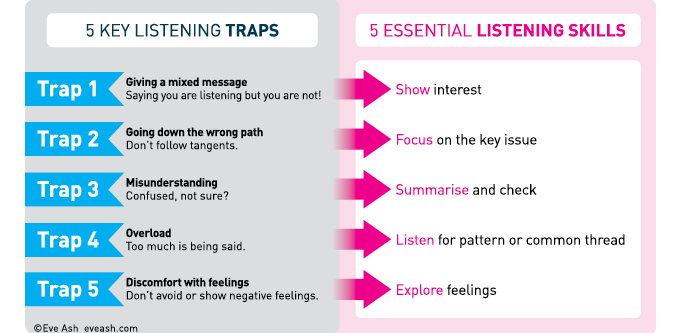We often think we are as good a listener as we are a talker. However, with the best will in the world, people fall into the following traps:
1. Giving a mixed message – saying you’re listening but you’re not. The “light’s on but no-one’s home” expression is a giveaway. You might be trying to be polite of course – you may be busy and this person’s yammering at you, but perhaps it’s best to simply say “I would like to listen to you, but I must finish this first. Will you be available in x minutes or an hour?” Then give that person your undivided attention. Showing interest is a bonus, but do listen and look at the person while they’re speaking. If you’re really paying attention to him/her, you may learn something important. Even if you don’t, you’ve made the time to give them time. It’s good for both of you.
2. Going down the wrong path – don’t follow tangents. The person speaking may indirectly flag something that you believe is more important. You may well be right, but concentrate on what the main focus is – what they’re asking you to address. Don’t jump to your viewpoint and increase their defensiveness. Allow the speaker some space to express him/herself. Some reporters fail to do that and when their interview is with a very high profile person, and if this is broadcast nationally everyone notices.
Address their concerns through active listening. Once you’ve done so, you can then bring up the topic or tangent you wish them to consider.
3. Misunderstanding – confused about what the other person’s saying? Always ask questions to check that you’ve understood. Ignore any colleagues who eye-roll (you may be dealing with an impatient type who expects you to be a mind reader), be tactful when you question, and s/he might get the message that not everything they say is self-evident or worse, is capable of being misconstrued. There’s a second category of misunderstanding: selective hearing. Someone starts to tell you about something they need for their work, they take a while to get to the point, you get distracted and start thinking of other things – next thing you’ve only picked up parts of what is said… possibly ignoring parts you subconsciously didn’t want to hear. Then misunderstandings multiply.
4. Overload – too much is being said. Whether you’re the speaker or the listener, break what’s being said down into chunks. Listen for a pattern or common thread, and ask questions accordingly. Think of yourself as being a warm but purposeful radio interviewer whose duty is to both the audience (they don’t want to be bombarded with stuff) and the interviewee who may need low-level but pleasant interjections that keep the topic on track. This assists the speaker to better convey their meaning, and the listener to absorb more usefully. Otherwise you both develop the conversation equivalent of indigestion!
5. Discomfort with feelings – you may be listening to something that makes you deeply uncomfortable. The way some people express themselves may be untidy, ugly, raw, angry, or leave you struggling for emotional breathing space. This type of listening skill is the most difficult to achieve, but we can all practice. Even if you’re feeling battered by the speaker’s invective – and assuming it’s not directed at you, but about something causing the speaker pain or emotion – try to understand what they’re driving at. You are exploring the person’s feelings together. Don’t drown – keep a mental life ring around you and stay calm. They may just want you to listen uncritically and without interjections of any sort. If this is so, communicate with your eyes. Or they may be seeking validation of their actions. Show empathy. Be aware, considerate and respectful.
Good listening is about providing space for another person to speak and be heard and ensuring they know they are being listened to.

